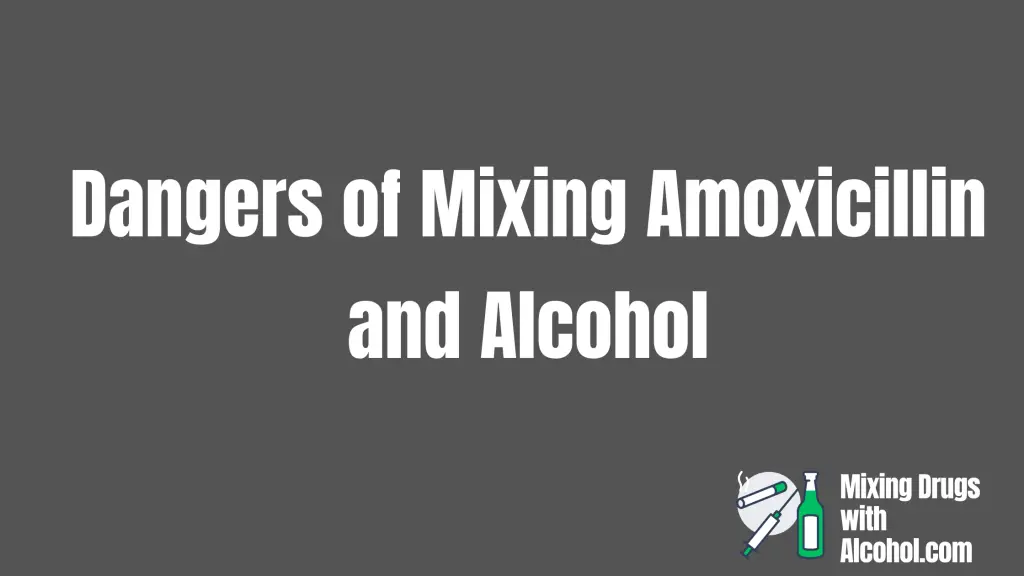Combining amoxicillin and alcohol can be dangerous. While amoxicillin treats bacterial infections, alcohol consumption may have adverse effects on your health.
This article aims to provide information to help readers understand the compatibility between amoxicillin and alcohol and reduce the potential for adverse effects. It will describe how the two substances interact, outline possible negative consequences, suggest ways to lower risks, and discuss situations where abstaining from drinking might be necessary.
How Long After Taking Amoxicillin Can You Drink?
The amount of time to wait can vary based on individual medical history and the type of antibiotic prescribed, but it is generally recommended to wait at least 72 hours after completing a course of antibiotics before consuming alcohol.
Waiting allows the medication to be fully absorbed and metabolized by the body without being diminished by the ethanol in alcoholic beverages.
If you have any questions or concerns about mixing amoxicillin with alcohol, it’s best to consult a healthcare professional who can provide personalised advice.
What Is Amoxicillin?
Amoxicillin is a penicillin-class antibiotic used to treat various infections by killing or preventing bacterial growth.
While typically safe at recommended doses, there is a potential for interactions when combined with other substances, including alcohol.
Is it Safe to Take Take Amoxicillin With Alcohol?
Mixing alcohol and antibiotics can have serious consequences, from minor side effects to long-term health issues. Although the two may seem like a good combination, the reality is more complex.
When taking amoxicillin for an infection, drinking alcohol can reduce the drug’s efficacy over time, potentially leading to relapse or a longer course of treatment.
Alcohol consumption while taking antibiotics can also cause uncomfortable adverse reactions, such as nausea and headaches, and increase the risk of liver damage and other medical complications related to excessive alcohol intake.
Prolonged antibiotic use can weaken the immune system, making individuals more vulnerable to infections.
It is important to consult a doctor about medication interactions with alcohol to make informed decisions about personal safety and wellbeing.
Side-Effects of Taking Amoxicillin And Alcohol
Possible side effects of drinking alcohol while taking amoxicillin include:
- Stomach irritation
- Nausea
- Dizziness, and
- Drowsiness
Long-term side effects of using alcohol alongside antibiotics such as amoxicillin can cause liver damage and other complications.
To avoid adverse reactions, it is generally advised to avoid combining alcohol with antibiotics.
Always follow dosage instructions carefully and consult with a healthcare provider or pharmacist if you have any questions or concerns about the safe use of prescription drugs.
How To Take Medication Safely
Taking medication safely is crucial for one’s health and wellbeing. Always read labels carefully to ensure that you take the correct dosage for your health condition and never exceed the prescribed amount.
Using a pillbox or calendar system can help you keep track of the pills that need to be taken at specific times throughout the day.
Setting an alarm on your phone as a reminder can help you remember when to take each dose. If there isn’t enough time between doses, splitting them into smaller amounts can help prevent adverse reactions in the body.
Amoxicillin And Other Drugs
Interactions between amoxicillin and other drugs can be complex and potentially harmful.
Taking multiple drugs together increases the risk of adverse reactions and side effects.
Amoxicillin And Caffeine Interaction
Mixing amoxicillin and caffeine can have potential interactions and risks. To minimise these risks, it is crucial to consider factors such as dosing frequency and timing.
Caffeine’s stimulating effect on intestinal motility may alter the absorption rate of amoxicillin. To reduce these risks, medical professionals advise patients to consult with their healthcare provider about proper dosages and potential side effects.
High doses of caffeine should be avoided while taking amoxicillin, as excessive consumption could lead to cardiac arrhythmia or severe central nervous system depression.
Any concerning symptoms like nausea, dizziness, rashes, or difficulty breathing should be reported to a physician immediately.
Frequently Asked Questions
What happens if you drink alcohol with amoxicillin?
Drinking alcohol with amoxicillin can increase the likelihood and severity of certain side effects such as dizziness, drowsiness, and stomach upset. It can also reduce the effectiveness of the medication and prolong recovery time.
How long after taking amoxicillin can you drink alcohol?
It is recommended to wait at least 48 hours after the last dose of amoxicillin before drinking alcohol. This allows enough time for the medication to be completely metabolized and eliminated from the body.
Can you drink alcohol with amoxicillin 500mg?
No, it is not recommended to drink alcohol while taking any dosage of amoxicillin.
Alcohol can interact with the medication and increase the risk of side effects and reduce its effectiveness.
What drinks to avoid while taking amoxicillin?
In addition to alcohol, it is recommended to avoid acidic drinks like orange juice, grapefruit juice, and cranberry juice as they can interfere with the absorption of amoxicillin.
What antibiotics can't you drink alcohol with?
There are many antibiotics that should not be mixed with alcohol, including metronidazole, tinidazole, and linezolid. Drinking alcohol while taking these medications can lead to severe side effects like nausea, vomiting, and headaches.
Can I have 1 beer while taking amoxicillin?
It is not recommended to drink any amount of alcohol while taking amoxicillin, as even one beer can increase the likelihood and severity of certain side effects and reduce the effectiveness of the medication.
Can I have 2 drinks on amoxicillin?
No, it is not recommended to drink any amount of alcohol while taking amoxicillin, as even two drinks can interact with the medication and increase the risk of side effects and reduce its effectiveness.
-
Centers for Disease Control and Prevention (CDC): “Antibiotic and Alcohol Interactions” (https://www.cdc.gov/alcohol/fact-sheets/antibiotics-and-alcohol-interaction.htm)
-
National Institutes of Health (NIH): “Amoxicillin” (https://medlineplus.gov/druginfo/meds/a685001.html)
-
National Library of Medicine (NLM): “Alcohol and antibiotics” (https://www.ncbi.nlm.nih.gov/books/NBK83250/)
-
American Academy of Family Physicians (AAFP): “Antibiotics and Alcohol” (https://www.aafp.org/afp/2005/1201/p2215.html)
-
Mayo Clinic: “Antibiotics and alcohol” (https://www.mayoclinic.org/healthy-lifestyle/consumer-health/expert-answers/antibiotics-and-alcohol/faq-20057946)

